As the pumpkin seeds and pomegranates came to Germany and what happened to them
A personal retrospective on the round room on the 16th June
Emigration and coexistence in a foreign culture- that’s the title of our online chosen subject to discuss about. But what does it actually mean “foreign culture”? What is “coexistence” all about? And in what way and why did emigration make us become different persons?
Dr. Abbas Abtahi, DIWAN member and psychotherapist, presents the rule for the discussion as well valid for our everyday life: “The highest form of intelligence is observing without judging!” And another quotation I picked up: “We all find ourselves in different rivers, where the flows vary. No one is at the secure shore.”
Really? No one? And I always thought as a German one would be at the secure shore. Well then, I observed and learned: As human beings we have basic human needs: Need of orientation, control, pleasure, coherence, commitment, and the need of increasing self esteem. All that is going to be called in questioned when we emigrate. We leave our stable context. We´re kind of forced to leave one part of our identity aside. So we have to rebuild it give it a new context. And at that point, what matters is, if we perceive ourselves as a designer (creator) or as a victim.
Here are some quotations of a very long and very exciting debate:
“I am in the wrong country. I never choose to live here. I was brought here as a child. The Germans to me are cold blooder. They have a great distance to their own families, to all feelings.
Then there are the Spanish and Italian people. For me they are warm blooder. They can laugh and cry together. My strategy here in Germany is: I have to learn to cope with the solitude. Solitude is the big subject here and there will always remain a distance between me and my friends. It’s a struggle. And being successful in my job, for me is very hard here as well…when I said all that to my uncle in Iran one day, he didn´t want to hear any of that. He only wanted to hear how I managed to do well and live my life in Germany.”
People that think this way, see themselves as victims. We always have a choice. A crisis is at the same time always a chance. And in a lot of Iranian families there are “cold blooders” as well. We should not romanticize our own identity too much.”
It´s been just a short while, since I m daring to speak farsi on the phone in the office in front of my colleagues. As a teenager I felt always ashamed doing that. This country is changing as well. It iss getting more colourful. You find pumpkin seeds and pomegranates in the super market. Emigration is not a one sided process. Emigration and integration are reciprocal processes. The question we have to ask is whether the Germans are integrated in this immigration society?”
My life in Germany has always been a challenge. I never looked back, always looked for the challenge. And despite all nostalgia: I have more in common with a German business woman, than with an Iranian farmer.”
“Here at DIWAN we can learn how to enrich the German culture with our sub cultures”.
(Shorted abstract of the German text. Translation: Yalda Zarbakhch)
